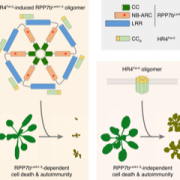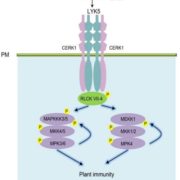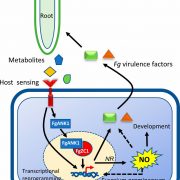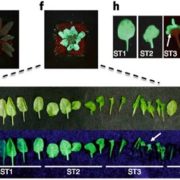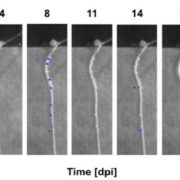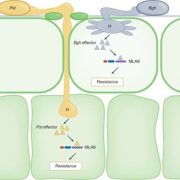Receptor-associated kinases control lipid provisioning in plant–fungal symbiosis
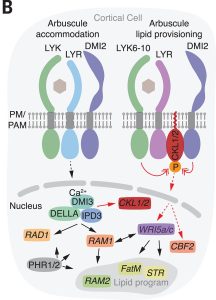 Most plants benefit from symbiotic associations with fungi, in which the fungi aid in nutrient update particularly of phosphate, and the plant returns the favor by supplying the fungi with lipids. Several but not all of the molecular players required for these important pathways have been identified. Here Ivanov and Harrison have uncovered additional components, the membrane-bound CYCLIN-DEPENDENT KINASE-LIKE proteins CKL1 and CKL2. The genes encoding CKL1 and 2 are upregulated in fungal-colonized Medicago truncatula roots. CRISPR/Cas9 mutations show that the genes are required for successful colonization and arbuscule establishment. Expression of these genes activates downstream pathways required for production of the lipid reward, and this activity depends on CKL1 and 2 kinase activity, membrane-localization, and interaction with the leucine-rich repeat receptor-like kinase DMI2 and a subset of LysM receptor kinases. (Summary by Mary Williams @PlantTeaching) Science 10.1126/science.ade1124
Most plants benefit from symbiotic associations with fungi, in which the fungi aid in nutrient update particularly of phosphate, and the plant returns the favor by supplying the fungi with lipids. Several but not all of the molecular players required for these important pathways have been identified. Here Ivanov and Harrison have uncovered additional components, the membrane-bound CYCLIN-DEPENDENT KINASE-LIKE proteins CKL1 and CKL2. The genes encoding CKL1 and 2 are upregulated in fungal-colonized Medicago truncatula roots. CRISPR/Cas9 mutations show that the genes are required for successful colonization and arbuscule establishment. Expression of these genes activates downstream pathways required for production of the lipid reward, and this activity depends on CKL1 and 2 kinase activity, membrane-localization, and interaction with the leucine-rich repeat receptor-like kinase DMI2 and a subset of LysM receptor kinases. (Summary by Mary Williams @PlantTeaching) Science 10.1126/science.ade1124


